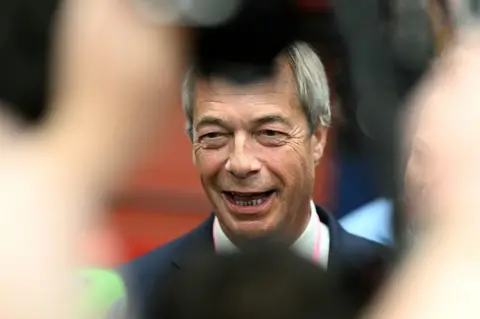In the wake of a dramatic local election night at the DCBL Stadium in Widnes, the spotlight is on the emerging political landscape shaped by the Reform UK party, led by Nigel Farage. With a narrow victory in the Runcorn and Helsby by-election, where a total of 32,655 votes were cast, this event marks a significant turning point for British politics. The conclusion of the recount at around half past five in the morning saw Sarah Pochin, the Reform candidate, emerge victorious, visibly shaking the political balance that has long been dominated by the established parties of Labour and the Conservatives.
With Farage present, alongside candidates Pochin and Labour’s Karen Shore, the atmosphere was palpable. It was clear that Reform had achieved a vital win in a critical battleground, emboldening their mission to disrupt the traditional party dynamics. For Labour, however, the night brought a stark sense of disappointment, underscoring their struggle to connect with the electorate in light of rising competition.
This election was not merely a local affair; it seems indicative of a broader shift occurring across England in the lead-up to the upcoming general elections. The local elections unveil a narrative that resonates with voters fatigued by the political status quo, prompting parties like Reform UK to capitalize on this sentiment. Their impressive polling figures are now reflected in actual electoral outcomes, revealing a pathway for them to expand their influence.
Reform UK’s success poses a potential double threat to both Labour and the Conservatives. As they consistently capture between a fifth to a third of the vote in various key contests, it becomes increasingly clear that they are positioned to challenge established political norms. In fact, during initial results from mayoral contests, Reform secured commendable second-place finishes—with 31% in Doncaster, 29% in North Tyneside, and 22% in the West of England—demonstrating their ability to appeal to a significant portion of the electorate.
The victory in Runcorn, coupled with their performance in other regions, entails critical implications for Farage and his party. They now face the challenge of transitioning from a party that critiques to one that must govern. The heightened scrutiny that comes with leadership roles will intensify the pressure on Farage and his appointees, such as Pochin and former Conservative minister Dame Andrea Jenkyns, the newly elected mayor of Lincolnshire.
While jubilant over the win, Farage must navigate the intricate dynamics of coalition politics among individualists within Reform UK. Labour sources are already questioning how a diverse collection of members, known for their contrarian views, will execute governance effectively. Simultaneously, Conservative leaders express concern over how long they might witness unity in Reform before individual ambitions threaten stability.
The Conservatives enter a bleak phase following disappointing electoral results, with fears that further losses loom in former strongholds, especially as the Liberal Democrats sense an opportunity to capitalize on Conservative vulnerabilities. The current government is preparing to recalibrate strategies and mitigate backlash by emphasizing a renewed focus on actionable policies, such as immigration and defense reviews.
As elections continue to unfold across various sections of England, the immediate outcomes signify a notable shift in the political narrative, recalibrating discussions around active governance and electoral accountability. With looming results that could further alter the political terrain, the government and the Conservative Party must confront their electoral realities and strategize accordingly to counteract the rising influence of Reform UK. As they stare into the political mirror, the challenge lies not only in adapting to changing sentiments but also in finding a way to ensure stability amid increasing fragmentation within the electorate. The unfolding political dialogue in the coming months will undoubtedly be shaped by these recent elections and their implications on party dynamics, accountability, and public trust in the democratic process.



